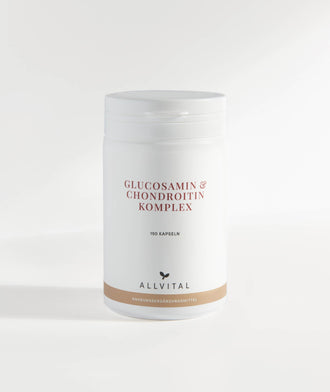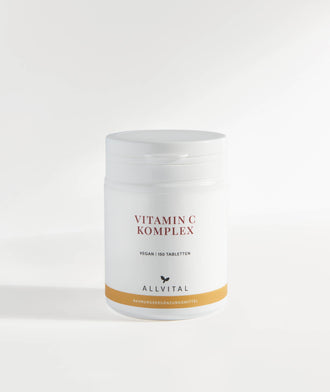
Vitamin C: A multi-talent for our health
In the cold season, people often emphasise how important a sufficient supply of vitamin C is for a strong immune system. But the benefits of this multi-talent go far beyond defence against colds.Find out everything you need to know about the effects and intake of vitamin C here.
What is vitamin C?
Vitamin C, also known as ascorbic acid, is one of the most important water-soluble vitamins. Unlike most animals, humans cannot produce vitamin C themselves, which is why it is an essential nutrient that must be obtained from food. As a water-soluble vitamin, vitamin C can hardly be stored in the body, so you need to consume a sufficient amount daily.
Effects of vitamin C
Vitamin C has a variety of effects on our health. We present the most important ones below.
Strengthening the immune system
Vitamin C supports various functions of the immune system and thus contributes to a healthy, strong immune defence. For example, the vitamin is present in high concentrations in the leukocytes, the white blood cells, which are important in defending the body from infectious agents among other things. The vitamin C content in these cells can be up to 100 times higher than in the blood (1).
Powerful antioxidant
Vitamin C is a powerful antioxidant and can therefore effectively protect our cells from free radicals. Free radicals are highly reactive particles that can attack important functional molecules (e.g. proteins) in our body so that they can no longer fulfil their biological function. A high exposure to free radicals combined with a lack of antioxidants favours the development of numerous diseases and contributes to premature ageing.
Regeneration of vitamin E
Vitamin E is also an important antioxidant in the human body. Vitamin C is able to regenerate "used" vitamin E and thus also indirectly increases the antioxidant capacity of our body.
Collagen formation
Collagen is a protein that serves as an important structural building block for numerous tissues in the human body. Vitamin C plays an indispensable role in the process of collagen synthesis, as it acts as a cofactor (auxiliary substance) for the enzymes involved.
Collagen is an important component of the skin and gives it firmness and resistance. Insufficient collagen production contributes to the development of cellulite, stretch marks and wrinkles and also leads to impaired wound healing.
In addition to the skin, collagen is also involved in the formation of bones, tendons and ligaments and is therefore of great importance for the health of our musculoskeletal system. Collagen is also an important component of the cornea of our eyes and the wall of blood vessels and is essential for anchoring the teeth to the jawbone. This explains why a severe vitamin C deficiency can even cause teeth to fall out.
Absorption of iron
Vitamin C improves the absorption of iron from plant sources by converting the iron into a form that can be better absorbed by the human body.
Further tasks
In addition to the functions mentioned above, vitamin C is also important for the transport of fatty acids and is therefore involved in our energy metabolism. It also serves as a cofactor for the formation of adrenaline and noradrenaline in the adrenal glands and contributes to the normal functioning of the nervous system.
How much vitamin C per day?
The Deutsche Gesellschaft für Ernährung (German Nutrition Society /DGE) recommends 110 mg of vitamin C per day for adult men and 95 mg for adult women. An increased requirement of 105 mg and 125 mg per day is recommended for pregnant and breastfeeding women (2).
From the point of view of orthomolecular medicine, these recommendations are clearly too low. The usual recommendation is 1000 mg per day or more.
People with chronic illnesses, high stress levels or heavy physical exertion in particular have an increased need for this important vitamin. Furthermore, toxins from the environment or food increase the need for vitamin C as an antioxidant even more.
How does a vitamin C deficiency manifest itself?
A severe deficiency can lead to the well-known "seafarer's disease" scurvy, which can cause bleeding into the skin, haemorrhaging of the gums and loss of teeth. The occurrence of such symptoms is also prevented by minimal levels of vitamin C in the diet, so that scurvy is practically non-existent in industrialised countries.
The symptoms that can occur even with a less serious deficiency are therefore more relevant. These include:
- increased susceptibility to infections
- deteriorated wound healing
- weak connective tissue
- tiredness, exhaustion
- hair loss
Where is vitamin C contained?
Vitamin C is found in many types of fruit and vegetables. However, long transport and storage times as well as preparation in the kitchen can lead to considerable vitamin loss. As a result, more than half of the original vitamin content can be lost. The best sources of vitamin C are therefore fresh, raw fruit and vegetables.
Food that has been cooked or pickled for a long time often loses a high proportion of its vitamin content. Steaming or braising vegetables for a short time is much gentler in comparison.
Foods with vitamin C
The following list compares the vitamin C content of different types of fruit and vegetables. The quantities given refer to 100 g of the raw food (3).
- Acerola cherry: 1700 mg
- Rosehip: 1250 mg
- Blackcurrant, black: 177 mg
- Parsley: 159 mg
- Bell pepper, red: 140 mg
- Bell pepper, green: 117 mg
- Kale: 105 mg
- Papaya: 80 mg
- Strawberry: 57 mg
- Lemon: 50 mg
- Orange: 45 mg
- Kiwi: 44 mg
- Blueberry: 22 mg
- Tomato, red: 19 mg
Should I take vitamin C as a dietary supplement?
Although the vitamin C content in the diet prevents a severe deficiency, it does not provide an optimal supply.
One important reason for this is the decreasing content of micronutrients in our food, which is linked to modern cultivation, intensive farming and long storage periods, among other things. At the same time, however, each individual's personal requirement for vitamin C and other micronutrients is also increasing, as we are now exposed to a wide range of pollutants, pathogens and stress.
A regular, ideally daily, intake of vitamin C (e.g. 500 - 1000 mg) supports the body in many ways and makes it more resistant to numerous harmful influences.
When should I take vitamin C?
Vitamin C can be taken at any time of the day. Furthermore, it can be taken both with meals and independently of food intake. If you take several capsules a day, it makes sense to spread them throughout the day.
Too much vitamin C?
If the body receives too much vitamin C at once (e.g. more than 3000 mg), this can lead to gastrointestinal complaints such as diarrhoea. The dose above which the intestine reacts sensitively varies from person to person.
If you are taking certain medications (e.g. blood thinners or psychotropic drugs), you should discuss the intake of vitamin C supplements with your doctor in advance, as interactions could occur and the effectiveness of the medication could be impaired as a result.
Caution is also advised for people affected by iron storage disease (haemochromatosis), as vitamin C also increases iron absorption. In addition, people who have a predisposition to increased oxalate formation should be careful when taking high doses of vitamin C, as a small proportion of the vitamin is metabolised to oxalate, which could increase the risk of kidney stones, which often consist of calcium oxalate.
Products from Allvital
Our preparation Vitamin C Complex contains various natural forms of vitamin C supplemented with the amino acid lysine and various plant extracts. Lysine supports the absorption of vitamin C. The plant extracts (e.g. green tea extract, citrus bioflavonoids) contain numerous secondary plant substances that have a variety of health-promoting effects and optimally complement the effects of vitamin C.
Other preparations with vitamin C include the Glucosamine & Chondroitin Complex which strengthens cartilage and bone health in particular, and the Carnitine Complex which specifically supports energy metabolism.
Sources
- Wehrmann M. Vitamin C zum Schutz vor SARS-CoV-2 und zur Behandlung von COVID-19. (Vitamin C for protection against SARS-CoV-2 and for the treatment of COVID-19.) Journal für Gynäkologische Endokrinologie/Schweiz. (Journal of Gynaecological Endocrinology/Switzerland.) 2020;23(3):94-102.
- Vitamin C. Deutsche Gesellschaft für Ernährung [Internet]. [accessed on: 14.02.2024].
- Bundeslebensmittelschlüssel (Federal Food Code) [Internet]. [accessed on: 15.02.2024].




